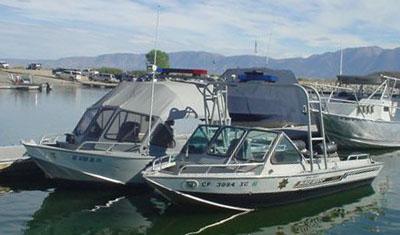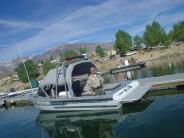Boating Enforcement
The Mono County Sheriff's Department operates a Boating Law Enforcement and Education Program under grant funding from the California Department of Boating and Waterways along with funding from the department's budget. This program has been in operation for more than 20 years.
We provide boating education and training to public schools, civic groups, and allied agencies. The boating unit provides medical aid, assists paramedics along with various search and rescue functions throughout the county. They also transport state researchers and study groups on water related issues and conduct inspections of private and commercial vessels.
The boating program operates 3 patrol boats: one is permanently stationed on Crowley Lake; another is stationed on Topaz Lake; and the third roams all waterways countywide. Mono County has numerous lakes and waterways which are navigable by powerboats, sailboats, canoes, and other watercraft.
Cruising your boat on the waterways of Mono County may not seem as dangerous as driving on the freeway, but boaters do get injured and sometimes killed if reckless or unprepared. The best water recreation the Eastern Sierra has to offer is yours if you play it safe. Whether you pilot a growling 120-horsepower ski boat or paddle a 12-foot canoe, you'll find lots of open water to enjoy in Mono County. There are more than 20 lakes here that are considered suitable for powerboats, canoes and kayaks. With a bit of caution and courtesy, you can enjoy our waters without becoming a statistic or a nuisance.
Most watercraft must be registered. All motorboats, including sailboats longer than 8-feet with engines, must have a valid boating sticker and CF number displayed if used on California waters. Our boating officers will issues citations for unregistered boats!
Consider these tips:
- Fed by mountain snowfall, lakes in the Eastern Sierra are cold, even during the summer. If your boat capsized, you could die from hypothermia before reaching shore.
- Carry approved safety equipment - especialy life vests for all passengers. Personal Floatation Devices (PFD's) must be worn by children 11 years of age or younger. Remember that PFD's are more difficult to put on once a person is in the water.
- Most lakes are frozen during the winter, but be careful. Thick ice can cut long holes in your boat's hull and thinner ice may not support your weight.
- Weather changes quickly in the mountains. Know when to come ashore before heavy rains or a thunderstorm hits.
- Know the Boating Rules of the Road. Powerboats should yield right of way to canoes, kayaks, and sailboats; however, non-motorized boaters should steer with courtesy and should be as visible as possible.
- All boaters should stay clear of fishing lines, swimming beaches, and dams. Watch for fallen waterskiers.
- Observe posted speed limits and go slower when there are other boats about. Know how your wake will affect other boaters and anglers.
- Please be respectful of our waters and land. Don't spill fuel or oil, and take bottles, cans, and trash back to be thrown away and recycled.
- Finally, don't boat under the influence of alcohol or drugs or while sleepy. Live to boat again.
Quagga Mussel Problems
The Quagga Mussel (along with the Zebra Mussel) has been positively identified in California waters. Please refer to the following websites for information dealing with these mussels and how you, as a boat owner, can help stop the spread of these animals in Mono County waterways.



